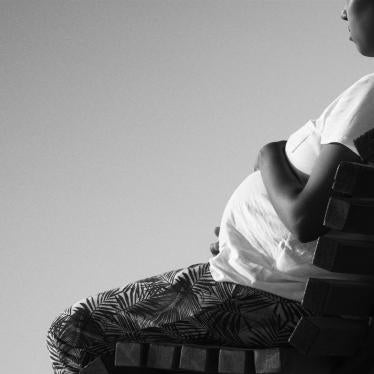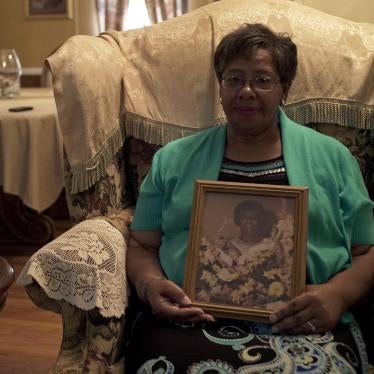Many thanks for the opportunity to provide a short statement in support of this important bill, Bill 24 – 0026 Maternal Health Resources and Access Bill of 2021, that seeks to improve health care for mothers and babies in the District of Columbia.
Human Rights Watch is a non-profit, independent organization that investigates allegations of human rights violations in more than 100 countries around the world, including in the United States, by interviewing victims and witnesses, gathering information from a variety of sources, and issuing detailed reports. Where human rights violations have been found, Human Rights Watch advocates for the enforcement of those rights with governments and international organizations and mobilizes public pressure for change.
Access to sexual and reproductive health care for women in the US is an ongoing area of concern for the women’s rights division of Human Rights Watch. Especially worrying are the inequities in access to quality and affordable care in this country and the extremely glaring racial disparities in health outcomes. We have researched and reported on the impacts of structural racism, discrimination, and inequality on women’s health outcomes in the US since 2017 and continue to build a strong research portfolio around this body of work. In 2018, for example, we published a report called “It Should Not Happen: Alabama’s Failure to Prevent Cervical Cancer Death in the Blackbelt” that examined how Black women there are dying at twice the rate of white women from a highly preventable and treatable disease that no woman should die from. In that report, and in other research in the US by our partners and allies, real access to health care – health care that women can easily reach even when they have competing demands on limited time and money – has been found to be a key barrier to survival and wellbeing.
DC’s disparities in maternal health outcomes are shocking. As the DC Primary Care Association report found, “while DC has one of the highest maternal death rates in the country (at 36 per 100,000 live births), white patients in the District have the lowest maternal mortality in the U.S., indicating deep racial and ethnic divides.”
This finding demands action. We support the common-sense proposals of this bill, including that doula support should be reimbursed by Medicaid; that a birthing center east of the river be seriously considered and, we hope, planned for; and that subsidies be provided that make it easier for pregnant people in DC with serious time and financial constraints to get to medical appointments.
The Universal Declaration of Human Rights, which the US helped to draft, states that everyone has the right to a standard of living adequate for the health and well-being of oneself and one’s family, including food, clothing, housing, medical care, and necessary social services. It also specifies that “motherhood and childhood are entitled to special care and assistance.”
The International Covenant on Economic, Social and Cultural Rights (ICESCR), which the US has signed though not yet ratified, recognizes “the right of everyone to the enjoyment of the highest attainable standard of physical and mental health.” The right to health entails that health services, goods and facilities should be available, accessible, acceptable and of good quality, without discrimination.
The International Convention on the Elimination of Racial Discrimination, which the US ratified in 1994, prohibits policies and practices that have the purpose or the effect of restricting rights based on race, including facially race neutral practices that create racial disparities. Under this treaty, the United States is obligated to act affirmatively to eliminate policies and practices with discriminatory impacts.
We hope that this bill is just one of others that emerge to protect maternal health and end DC’s racial disparities. We would like to take this opportunity to draw attention to the need to include maternal health care in DC’s priorities as the capital continues to build a more resilient and healthier city, including in the face of climate change.
According to the Union of Concerned Scientists, Washington, DC, has historically experienced around 7 days a year with a heat index of 100 degrees Fahrenheit, a temperature that can be dangerous for anyone to be moving or exerting themselves in, but more dangerous for pregnant people. By the middle of this century, DC is now on track for 41 such days a year. A growing body of research shows a link between exposure to high temperatures and preterm birth and we already know that pregnant people are more likely to suffer heat stress, especially dangerous for pregnant people with pre-existing conditions or conditions linked to pregnancy such as higher blood pressure. The climate crisis threatens to worsen the US maternal and infant health crisis.
DC can be a leader by designing and implementing climate adaptation plans that protect women’s rights and the health of families.
We urge DC legislators to find ways to integrate the response to climate change in DC with adaptation measures that consider maternal health concerns and center the disparities systemic racism has created here. A committee or other body should be mandated to examine and monitor the current and future impact of the climate crisis in DC, especially for communities with the least resources to manage additional stresses and that include those with already shockingly high rates of preterm birth. Doulas and other frontline birth workers should get training on heat health information and simple interventions, such as water consumption and affordable ways to keep homes cool, and all pregnant people should be able to find out basic information about environmental health impacts such as air pollution and heat in DC. Adaptation efforts such as tree planting and green space development should be planned in ways that prioritize areas with high birth rates and worse birth outcomes.








